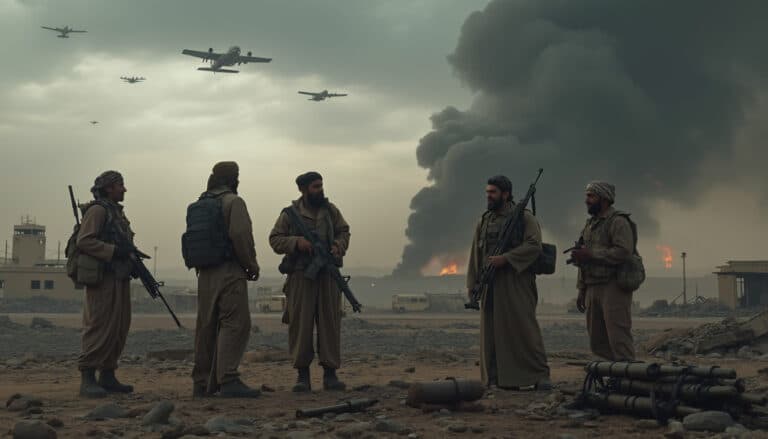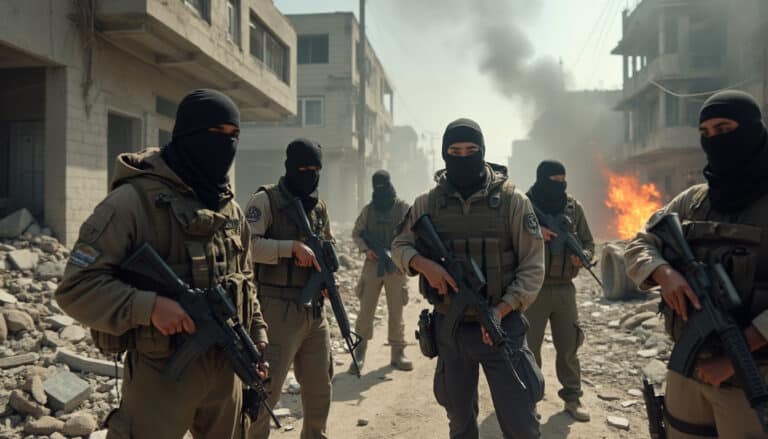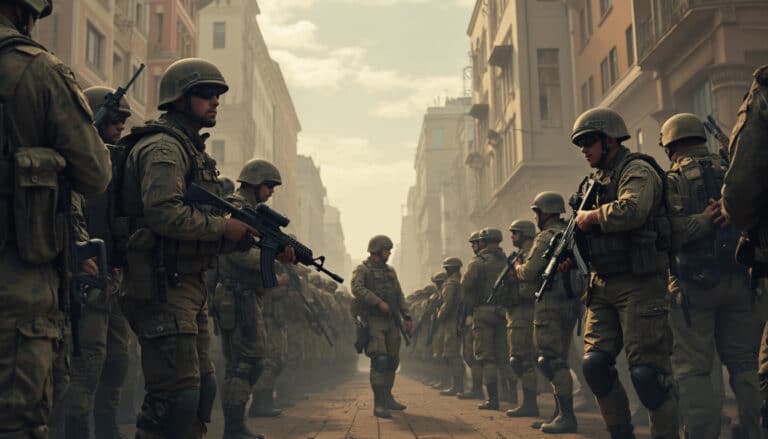A new wave of tensions envelopes the Middle East. The Israeli army intensifies its airstrikes in southern Lebanon. Hezbollah is once again at the heart of the hostilities.
The recent attacks targeted strategic infrastructures, resulting in the death of a fighter from Hezbollah. According to Lebanese media, a building in the Toul area was hit, prompting residents to evacuate. Despite a ceasefire instituted in November, tensions persist, threatening to rekindle past hostilities. Lebanese authorities strongly condemn these actions, labeling them as blatant violations of peace agreements.

Tensions between Israel and Hezbollah continue to rise in southern Lebanon, marking a worrying escalation in an already fragile region. The recent Israeli airstrikes targeted several presumed Hezbollah infrastructures, resulting in the death of a fighter from the militant group. This article explores the ins and outs of this confrontation, its regional and international implications, as well as local reactions to this military escalation.
Table des matières
ToggleWhat are the causes of Israeli strikes in southern Lebanon?
The Israeli strikes in southern Lebanon are part of a military escalation that continues despite the November ceasefire aimed at stabilizing the region after more than a year of intermittent conflicts. Israel recently announced that it targeted a Hezbollah command center, signaling a clear intention to neutralize the military capabilities of the group. These actions are motivated by the continued presence of armed Hezbollah infrastructures near the Israeli border, which poses a direct threat to Israel’s security.
The situation has been exacerbated by perceived violations of the ceasefire, notably by Hezbollah, which has continued its military activities beyond the terms of the truce agreement. The armament and troop movements of Hezbollah have prompted Israel to intensify its strikes to prevent the reconstitution of the group’s terrorist capabilities, as indicated in recent military statements.
What have been the impacts of the strikes on infrastructures and the civilian population?
The strikes primarily targeted military sites and presumed Hezbollah infrastructures, including buildings used as operational bases and weapon storage locations. The attack on the city of Toul notably endangered the civilian population, despite warnings issued by Israeli military authorities requesting the evacuation of residents within a radius of 500 meters around the targeted sites.
Fortunately, there have been no immediate reports of civilian casualties in the Toul area. However, the proximity of residential areas to military infrastructures increases the risk of civilian losses in the event of ongoing strikes. Residents live in constant uncertainty, having to move regularly to avoid attacks, leading to a deterioration of their living conditions and a rise in social tension.
Moreover, other operations in the Rab El Thalathine area have resulted in the deaths of Hezbollah fighters, reinforcing the perception of a systematic campaign aimed at weakening the militant group. These actions aim to reduce Hezbollah’s influence in the region and prevent any resurgence of its terrorist activities.
How is the international community reacting to these developments?
The international community’s reaction to Israeli strikes in southern Lebanon is mixed. While some countries support Israel’s right to defend itself against security threats, others express concern over the escalation of violence and call for a resumption of negotiations for the complete disarmament of Hezbollah in accordance with the November ceasefire agreement.
The United Nations has reaffirmed the importance of maintaining peace and security in the region, reminding that Lebanese forces and blue helmets must remain the only armed entities in southern Lebanon. However, the persistence of strikes indicates an inability of the parties to achieve sustainable balance.
Meanwhile, humanitarian organizations express growing concerns about the situation of civilians affected by hostilities. Humanitarian access to affected areas remains limited, hindering relief efforts and exacerbating the suffering of local populations.
What are the stakes for the upcoming municipal elections?
The recent wave of violence comes at a critical time for the municipal elections scheduled in southern Lebanon. Prime Minister Nawaf Salam has strongly criticized the Israeli strikes, labeling them as repeated aggressions that exacerbate an already tense situation. This dynamic puts additional pressure on candidates and voters, who must navigate between security concerns and local political aspirations.
Hezbollah leader Naim Qassem has called on his supporters to turn out in large numbers at the polls, promising a sweeping victory that would further consolidate the group’s position within the Lebanese political landscape. This mobilization could influence election results, further strengthening Hezbollah’s presence in the region and complicating de-escalation efforts.
Current tensions risk polarizing the electorate, dividing the population between those who support Israel’s military actions to ensure national security and those who call for an end to hostilities to promote a climate of peace and stability.
What are the future prospects for stability in southern Lebanon?
In the short term, the situation remains volatile with the possibility of new military escalations. Israel has clearly indicated its intention to continue its operations to neutralize the threats posed by Hezbollah, while the latter seems determined to maintain its presence and military capabilities in the region.
In the long term, stability in southern Lebanon will depend on several key factors, including the ability of both parties to return to the negotiating table and engage in constructive dialogue aimed at de-escalating tensions. The involvement of international actors could play a crucial role in facilitating these discussions and ensuring the respect of ceasefire agreements.
Furthermore, the question of Hezbollah’s disarmament and the de-escalation of hostilities is essential to prevent a resurgence of violence. Cooperation between Lebanese and international forces could be strengthened to monitor and control military activities in the region, thereby ensuring a gradual reduction of tensions and increased security for local populations.
In addition, humanitarian efforts must be intensified to support victims of conflicts and restore essential infrastructures. Reconstruction and support for affected communities are essential elements for restoring trust and promoting lasting peace in southern Lebanon.
How does this situation affect regional dynamics in the Middle East?
The Israeli strikes in southern Lebanon have significant repercussions on regional dynamics in the Middle East. The escalation of tensions could attract the attention of other regional actors, such as Iran, which supports Hezbollah, and provoke a chain reaction in other countries in the region.
The stability of Lebanon is intrinsically linked to that of neighboring countries, and any destabilization could have consequences in terms of refugee flows, redistribution of political alliances, and strengthening the military capacities of various armed groups. The rivalry between Iran and Israel, already intense, could be exacerbated by reciprocal attacks, making the region even more unstable.
Moreover, international relations are also affected, with world powers calling for restraint and diplomacy to avoid uncontrolled escalation. Strategic alliances and economic interests in the region play a crucial role in how events unfold and in potential solutions to restore peace.
Finally, the current uncertainty could influence global energy markets, as the Middle East remains a key region for oil and gas supply. Any prolonged instability could affect prices and supply chains, having economic repercussions worldwide.
What are the consequences for Israeli domestic politics?
Military operations in southern Lebanon also have internal implications for Israel. Maintaining national security is a priority for the government, but military actions may be perceived ambivalently by the population. The Prime Minister, faced with rising tensions, had to cancel the dismissal of his Defense Minister, a decision indicative of internal political pressures in the face of the growing security crisis. For more information, see this analysis.
The management of security and relations with Hezbollah greatly influences the government’s popularity and its electoral prospects. Citizens expect effective actions to ensure border protection and preserve domestic peace, while being concerned about the humanitarian consequences of military operations.
Moreover, ongoing political debates regarding the use of advanced military technologies, such as the drones/”>M61 Vulcan anti-missile defense systems, show a shift towards modernizing defense capabilities. These initiatives are crucial for maintaining a strategic balance against emerging threats and new forms of asymmetric warfare.
Israeli domestic politics must also navigate between security demands and the need for international diplomacy to avoid uncontrolled escalation. Decisions made by the government today will have a lasting impact on the country’s stability and resilience in the face of future challenges.
What is the role of the media and public opinion in this conflict?
The media plays a central role in shaping public opinion and disseminating information regarding the Israeli strikes in southern Lebanon. Extensive and diverse media coverage allows citizens to follow events in real-time, understand the motivations of the different parties, and react accordingly.
However, media coverage can also exacerbate tensions by disseminating sensitive information or showing bias, thereby influencing public perception of the conflict. It is crucial for the media to maintain a high level of rigor and objectivity to avoid misinformation and promote a balanced understanding of the issues.
Citizens’ opinions are also shaped by social networks and online platforms, which can serve as vectors for mobilization or disinformation. The narratives propagated on these platforms can have a significant impact on social stability and community cohesion, especially in contexts of armed conflict.
Furthermore, initiatives by certain independent and international media contribute to providing varied perspectives and highlighting the voices of populations affected by the strikes, thus offering a more comprehensive and humane view of the conflict.
Finally, the role of the media in documenting and denouncing human rights violations and war crimes is essential to ensure ongoing vigilance and to promote justice and accountability for the actors involved.
What is the importance of international support in resolving the conflict?
International support is crucial for the peaceful resolution of the conflict between Israel and Hezbollah in southern Lebanon. International actors, including major powers and regional organizations, can play an essential mediating role to facilitate negotiations and encourage a return to dialogue between the conflicting parties.
International diplomatic efforts should aim to strengthen the respect of existing ceasefire agreements and promote concrete measures for the disarmament of non-state groups like Hezbollah. Inclusive peace initiatives, involving all stakeholders, are necessary to establish mechanisms for trust and mutual cooperation.
Furthermore, the international community can provide humanitarian assistance and support for the reconstruction of damaged infrastructures, thus helping to alleviate the suffering of civilian populations and restore some normality in areas affected by conflicts.
Sanctions and diplomatic pressures can also be used as levers to encourage parties to adopt more responsible behaviors and to respect international laws. Close coordination between nations and international organizations is essential to maximize the effectiveness of these measures and to ensure a coherent and unified response to the challenges posed by this conflict.
Finally, the ongoing commitment of international actors in monitoring and assessing progress made in the peace process is essential to maintain a positive dynamic and to intervene quickly in case of a resumption of hostilities.
#FicheActu I Le rôle du Hezbollah dans le conflit Israël-Hamas
— IHEDN (@IHEDN) October 12, 2024
📍Un an après l’attaque du 7 octobre 2023, le bilan humain estimé est dramatique : 41 909 morts dans la bande de #Gaza, dont un tiers d’enfants, près de 100 000 blessés et 1,9 million de déplacés internes, selon… pic.twitter.com/isbkf9mxbT























